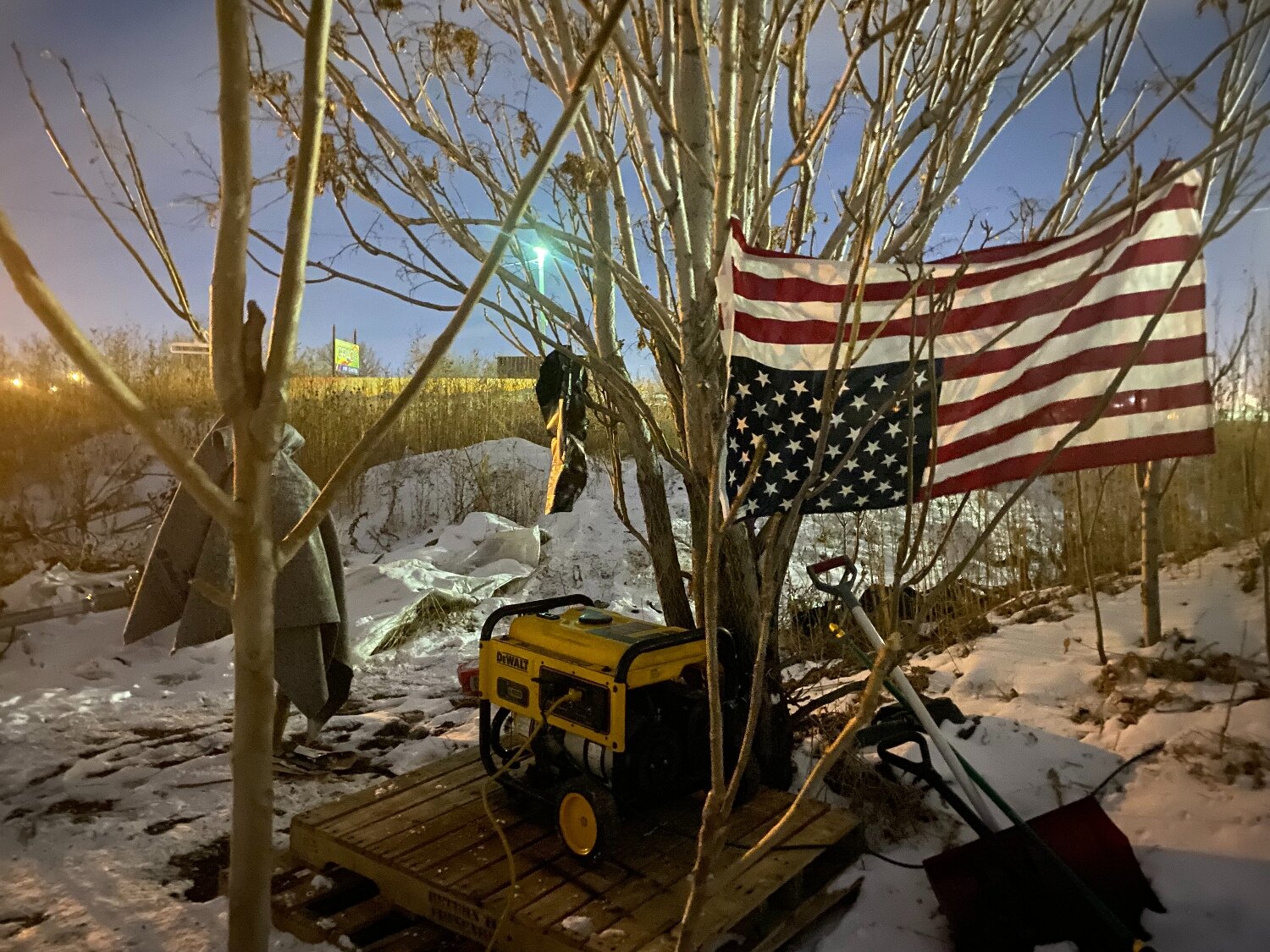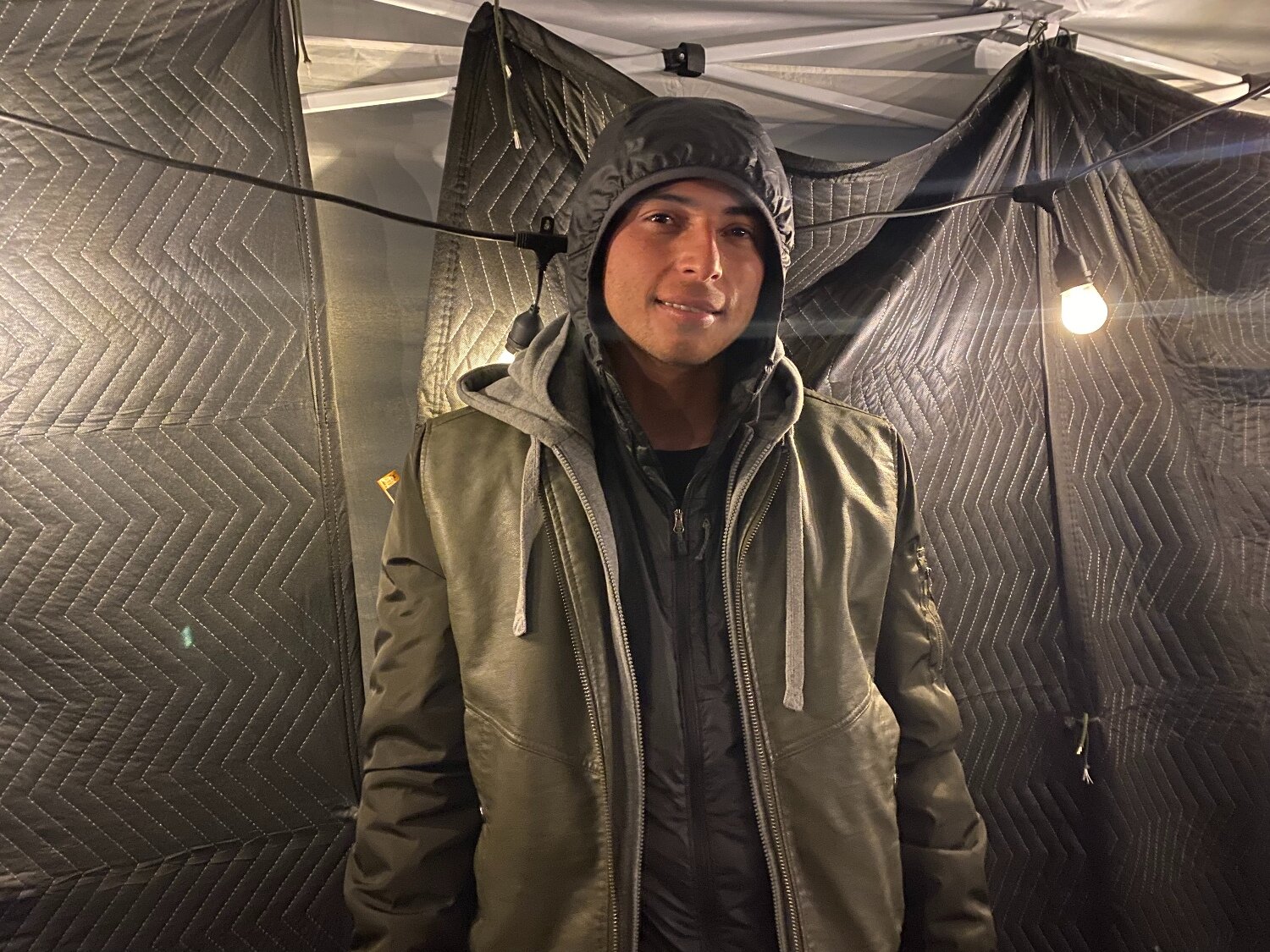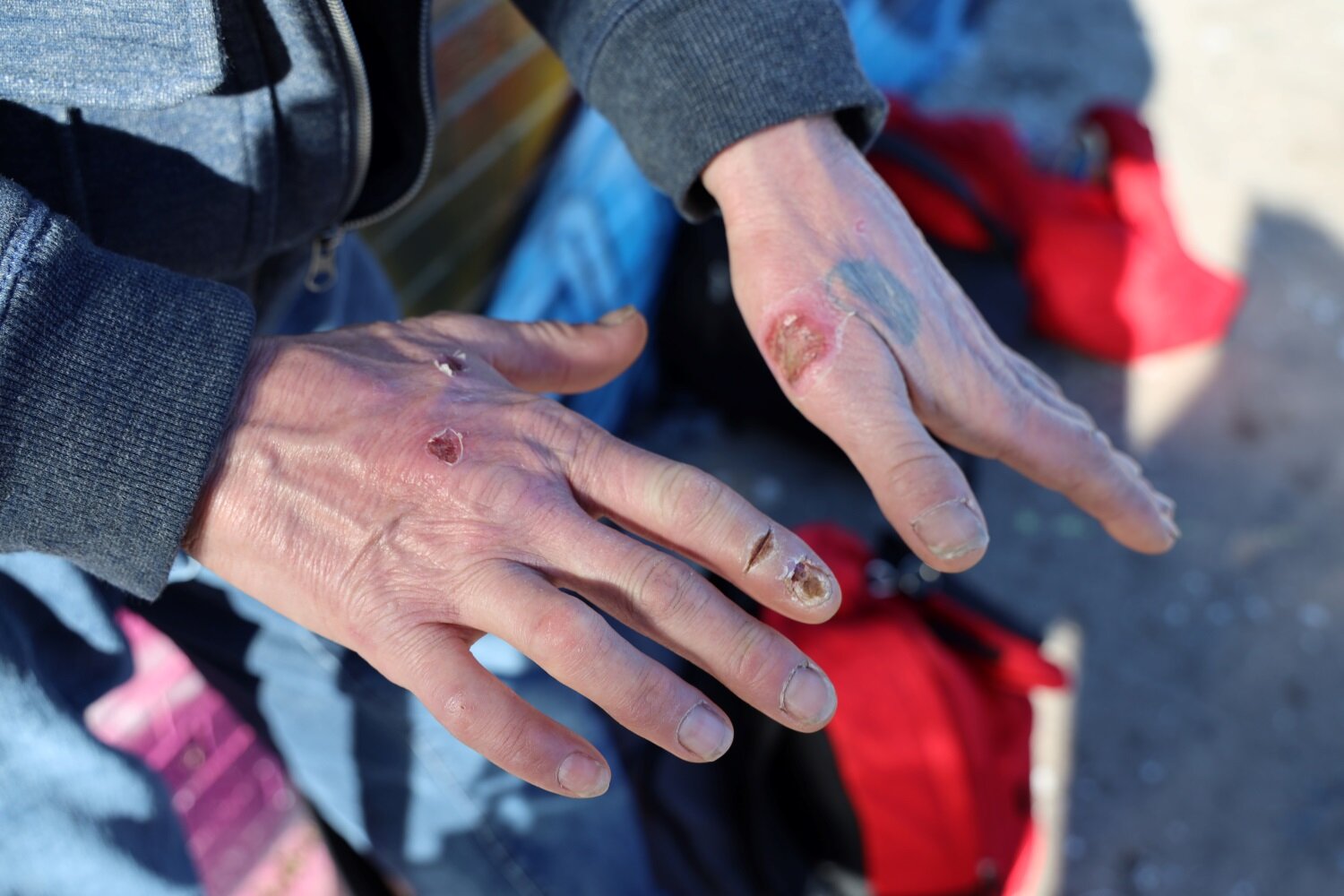As Denver officials debate warming centers, migrants and the unhoused learn to sleep cold

DENVER — A resolution to open warming shelters at 32 degrees — rather than 20 — and to prevent Denver Police Department officers from sweeping unhoused people during freezing temperatures passed the city’s Budget and Policy Committee on Jan. 8. City Council will conduct a final vote on the resolution Jan. 29.
Raven Cole, a homeless person and advocate against freezing sweeps, supports the resolution. Cole said forcing people out of their tents in dangerous temperatures brings added trauma as campers gather their belongings and head into the cold.
“We are trying to stay out of sight, out of mind,” Cole said. “We were all freezing and they wanted us to come out of our tent into the additional cold.”
That cold was recently on display in an empty field on the northern edge of Denver’s Globeville neighborhood, where 10 tents sat blanketed in fresh snow, wind whipping their flaps around. The people inside cocooned themselves in blankets — five to six seemed to be the magic number to keep warm on the coldest nights of Colorado’s deep January freeze.
At the edge of the encampment, a makeshift kitchen provided camping stoves, canned soups, boxed pastries and instant coffee had quilts draped from the ceilings of a canopy to insulate from the cold.
“It’s worse out here than in the shelters because it’s very cold in the streets,” said Jose, a Venezuelan migrant who declined to use his last name, as he twirled a plastic spoon through a Styrofoam cup full of hot cocoa.
Many migrants living outside said Jan. 12 through Jan. 14, in which Denver’s sub-zero temperatures brought a colder forecast than Antarctica’s, were some of the hardest days of their lives.
At Zuni Dos, so named after the intersection of Speer Boulevard and Zuni Street where many had camped before authorities cleared the street, every visitor was offered a choice: coffee or hot chocolate. People could have both, but Jose insisted they pick at least one.
“The police came last week, but I don’t know what they said to us, because they don’t speak Spanish and we don’t speak English,” he said.
Thousands of migrants — most from Venezuela — have arrived in Denver over the past six months. The city and state’s elected officials have responded by calling on the federal government to take emergency action, claiming Denver does not have the resources to handle the constant influx.
A letter to FEMA from Colorado’s Democratic congressional delegation states Denver alone has spent $33 million in attempts to meet the needs of more than 32,000 migrants, with more expected to arrive in coming months.
Housekeys Action Network Denver said the city swept the “Zuni Dos” camp on Friday. The Denver Police Department did not immediately return a call for comment.

An upside down American flag hangs between tree branches at an encampment of migrants in Denver’s Globeville neighborhood.
Photo: Alison Berg, Rocky Mountain PBS
Jose said a lack of Spanish-speakers in the housing navigation system is another barrier that makes life in the United States feel impossible.
In 2020, Jose walked from Venezuela to Texas, where he hoped to settle in and buy a house for his mother. As the only man in his family, Jose said he felt a duty to create a better life for his mother and sisters than what they had in Venezuela.
But upon arrival in Texas, Jose said he was arrested and deported to Mexico. In 2023, he journeyed again from Mexico to Texas, landing in Utah. After two months in Utah, Jose said he left the state for neighboring Colorado, because he was told Colorado had more Spanish-speakers and better resources for undocumented immigrants.
“I’ve always just wanted to help my mom,” Jose said.
Jose has tried to get a job and find permanent housing, but both are nearly impossible while living undocumented. He feels shame in asking people for money, he said, so he primarily gets by with the help of other migrants and homelessness advocates.

Jose, a Venezuelan migrant, stands inside a warming tent at an encampment called “Zuni Dos.”
Photo: Alison Berg, Rocky Mountain PBS
V Reeves — an activist with Housekeys Action Network Denver — said Jose’s story is one of thousands. Migrants who’ve left South and Central America for what they believed would be better lives in the United States, only to be kicked out of shelters, barred from employment opportunities and transported from state to state with little information or help.
“These guys are so used to being put on a bus or taken somewhere random and having no information and understanding of what's happening next,” Reeves said.
Coming from a much warmer climate, Jose said he was unprepared for the bitter freezes and piles of snow in Denver.
“It’s just so much colder than anything else,” Jose said.
Other unhoused people said they’re faced with tough choices on Denver’s coldest days. Shelters are overcrowded, separate people from their partners and communities, have strict rules and offer no privacy.
But the streets are dangerous without several layers of warm clothing and insulated tents.
“What it does is it builds character inside yourself,” said Brooks, who is houseless and stays at Denver Rescue Mission. Brooks has sores on his hands from previous frostbite, so staying outside on the year’s coldest nights is not an option for him.

Brooks, a houseless man who stays at Denver Rescue Mission most cold nights, shows sores on his hands he says are from frostbite.
Photo: Elle Naef, Rocky Mountain PBS
Brooks said the decision to stay in shelters is easier when the alternative is life-threatening cold. But shelters only operate at night, and warming centers — which the city opens when daytime temperatures drop below 20 degrees — are often overcrowded. Jose and others interviewed added that warming centers can be inaccessible because of their location and lack of Spanish-speaking staff members.
More information on city shelters and warming centers is available here.
Alison Berg is a reporter at Rocky Mountain PBS. Alisonberg@rmpbs.org.
